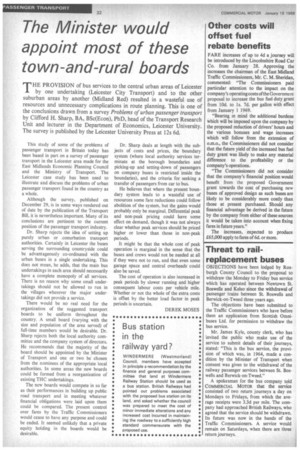The Minister would appoint most of these town-and-rural boards
Page 34

If you've noticed an error in this article please click here to report it so we can fix it.
THE PROVISION of bus services to the central urban areas of Leicester by one undertaking (Leicester City Transport) and to the other suburban areas by another (Midland Red) resulted in a wasteful use of resources and unnecessary complications in route planning. This is one of the conclusions drawn from a survey Problems of urban passenger transport by Clifford H. Sharp, BA, BSc(Econ), PhD, head of the Transport Research Unit and lecturer in the Department of Economics, Leicester University. The survey is published by the Leicester University Press at 12s 6d.
This study of some of the problems of passenger transport in Britain today has been based in part on a survey of passenger transport in the Leicester area made for the East Midlands Economic Planning Council and the Ministry of Transport. The Leicester case study has been used to illustrate and discuss the problems of urban passenger transport found in the country as a whole.
Although the survey, published on December 29, is in some ways rendered out of date by the publication of the Transport Bill, it is nevertheless important. Many of its conclusions are pertinent to the current position of the passenger transport industry.
Dr. Sharp rejects the idea of setting up purely urban or .conurbation transport authorities. Certainly in Leicester the buses serving the surrounding countryside could be advantageously co-ordinated with the urban buses in a single undertaking. This does not mean, he adds, that the main bus undertakings in each area should necessarily have a complete monopoly of all services. There is no reason why some small undertakings should not be allowed to run in the villages wherever the major undertakings did not provide a service.
There would be no real need for the organization of the suggested transport boards to be uniform throughout the country. A small board (varying with the size and population of the area served) of full-time members would be desirable. Dr. Sharp rejects both the local authority committee and the company system of directors. He recommends that the majority of the board should be appointed by the Minister of Transport and one or two be chosen from the nominees of the appropriate local authorities. In some areas the new boards could be formed from a reorganization of existing THC undertakings.
The new boards would compete in so far as their performances in building up public road transport and in meeting whatever financial obligations were laid upon them could be compared. The present control over fares by the Traffic Commissioners would cease to have any purpose and could be ended. It seemed unlikely that a private equity holding in the boards would be desirable. Dr. Sharp deals at length with the subjects of costs and prices, the boundary system (where local authority services terminate at the borough boundaries and picking-up and setting-down of passengers on company buses is restricted inside the boundaries), and the criteria for seeking a transfer of passengers from car to bus.
He believes that where the present boundary system leads to a wasteful use of resources some fare reductions could follow abolition of the system, but the gains would probably only be marginal. Differential peak and non-peak pricing could have some effect on demand, though it was not always clear whether peak services should be priced higher or lower than those in non-peak periods.
It might be that the whole cost of peak operation is marginal in the sense that the buses and crews would not be needed at all if they were not to run, and that even some garage space and central overheads could also be saved.
The cost of operation is also increased in peak periods by slower running and higher consequent labour costs per vehicle mile. Whether or not the whole of the extra costs is offset by the better load factor in peak periods is uncertain.
DEREK MOSES




















































































































